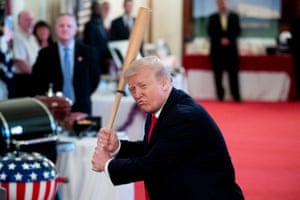- Officials prevent municipal gatherings in effort to slow spread
- Experts urge Americans at barbecues to follow health guidelines

Photograph: Scott Olson/Getty Images
The Fourth of July is traditionally for barbecues, fireworks, boisterous partying and various hijinks to celebrate Independence Day. But this year, with coronavirus cases soaring to all-time highs, medical experts warn that the normal US holiday exuberance could instead create infection “superspreader” events.
Across the country, thousands of official public celebrations have been canceled in an effort to prevent mass gatherings. Two notable exceptions are the fireworks planned by the Trump administration in the center of Washington, and an event on Friday night at Mount Rushmore in South Dakota where the president will attend a fireworks display.
This event has managed simultaneously to upset Native American leaders who consider the location stolen tribal land; irritate those worried about wildfires in the parched landscape, where fireworks have been banned in recent drought years; and further divide views on health precautions, with the Republican governor of South Dakota saying social distancing will not be enforced and anyone who doesn’t like that idea can “stay home”.
Most municipal celebrations will not happen. But large groups are still expected in backyards, homes and streets, as Americans strain to celebrate their liberation from British rule.
And with the country reporting record highs of new coronavirus cases, officials say the impact of Fourth of July events could be catastrophic.
“It’s set up a perfect storm,” Joshua Barocas, an infectious disease physician at Boston Medical Center, said during a briefing by the Infectious Diseases Society of America.
“The combination of travel, the combination of reopening – perhaps in some cases too early – and the combination of people not necessarily following some of these preventive guidelines.”
The US recorded 52,000 new cases on Wednesday, according to Johns Hopkins University figures, a new all-time daily high for the US in the outbreak. It was the fifth daily high in the last eight days.
On Thursday morning, infections were rising in up to 40 states, and 14 states reported record daily highs.
About 40% of the US is now changing course on reopening in an attempt to quell the unprecedented surge, and states are pleading with people not to engage in group revelry.
In Austin, Texas, that warning took the form of an emergency alert to people’s phones, which urged them to celebrate Independence Day responsibly.
“Coronavirus is spreading rapidly in Austin-Travis county,” read the alert, which buzzed up on screens across the city.
“Stay home. Avoid non-household gatherings. Keep six feet apart from there. Wear a face covering. Wash your hands frequently.”
Texas is among the states worst affected by the recent surge. The state, which was one of the first to reopen bars, restaurants and hair salons in May, recorded its highest ever number of daily coronavirus cases this week, and several hospitals in Houston are at or near full capacity.

In Alabama, a group of students held “Covid parties” this week, according to Tuscaloosa city councilor Sonya McKinstry, where students wagered over who would become infected.
“They put money in a pot, and they try to get Covid. Whoever gets Covid first gets the pot. It makes no sense,” McKinstry told ABC News. “They’re intentionally doing it.”
The parties fly in the face of advice from the Alabama department of public health, which has asked people to maintain a 6ft distance, and explained the concept of superspreader events in guidance sent out to local governmental officials.
“Asymptomatic spread of Covid-19 is a major risk factor. These ‘superspreaders’ do not know they are carrying the disease,” the health department said.
“It is estimated one in four infected people are ‘superspreaders’. For this reason, we strongly recommend wearing masks in public gatherings.”
California, which had been making progress on getting infections down, is now the new US’s worst hotspot. The Riverside county public health officer, Cameron Kaiser, warned that the effect of people gathering to toast Memorial Day, a public holiday in May, was stark.
“We don’t want any more closures, but our numbers are going through the roof,” Kaiser told the New York Times.
The California, governor ordered the closure of all recently reopened bars on Wednesday, banned indoor movie theater-going and dining at restaurants. Arizona’s governor, Doug Ducey, abruptly ordered bars, gyms, movie theaters and water parks to close.
Many beaches, a traditional Fourth of July rallying point, have been ordered to close. A majority of beaches in southern Florida will shut down from Friday, as will beaches in Texas and Los Angeles county.
Amid the warnings over the celebrations, Trump has remained defiant. He has insisted that the “Salute to America”, a huge firework-laden display of national pride which was started by the president last year, will go ahead in Washington, despite the city’s mayor urging against it.
Trump will speak at the event, which thousands attended last year, and the department of the interior said the display will be “a patriotic tribute to our men and women in uniform”.


